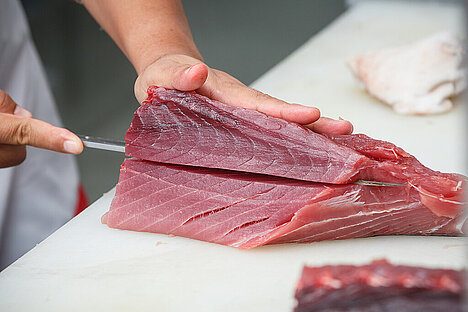Tuna protein

Tuna is a popular fish that is not only eaten by humans, but also by dogs. But what is tuna protein and how does it affect your dog's health? In this article, you'll find out everything you need to know about this ingredient.
What is tuna protein?
Tuna protein is the protein obtained from the muscle meat of tuna. It can be processed as a whole piece or as a powder. Tuna protein is a high-quality protein source that contains many essential amino acids that your dog needs for its growth, muscles and immune system.
What are the benefits of tuna protein for dogs?
Tuna protein has several benefits for dogs that you should be aware of. Firstly, it is very tasty and can therefore also appeal to picky dogs. Secondly, it is easy to digest and can help dogs with digestive problems or allergies. Tuna protein also contains lots of omega-3 fatty acids, which have an anti-inflammatory effect and can promote your dog's heart health and coat.
What are the disadvantages of tuna protein for dogs?
However, tuna protein also has some disadvantages that you should not ignore. For one thing, tuna can be contaminated with heavy metals such as mercury, which can accumulate in your dog's body and lead to poisoning. Secondly, tuna can have a high salt content, which can increase your dog's blood pressure and lead to kidney problems. Tuna can also have a high iodine content, which can affect your dog's thyroid function.
How much tuna protein can my dog eat?
The amount of tuna protein your dog is allowed to eat depends on various factors, such as his weight, age, activity level and state of health. In general, however, tuna protein should only be used as a supplement and not as the main component of your dog's diet. A rule of thumb is that your dog should not get more than 10 percent of its daily protein requirement from tuna protein. This equates to about a teaspoon of tuna powder or a small piece of tuna per day for a medium-sized dog.
Tuna protein is a tasty and nutritious ingredient for dogs that can offer some health benefits. However, you should also be aware of the potential risks and only feed tuna protein in moderation.
If you notice any signs of hypersensitivity or poisoning in your dog, you should see your vet immediately. We are not a substitute for a vet, but we try to be as accurate as possible. Every dog reacts differently and we recommend you get a second opinion or consult your vet if in doubt.
Stay healthy and take good care of your four-legged friend!😊